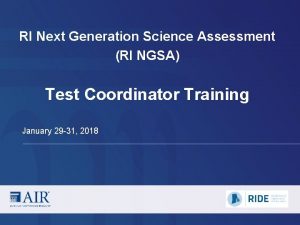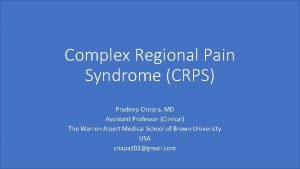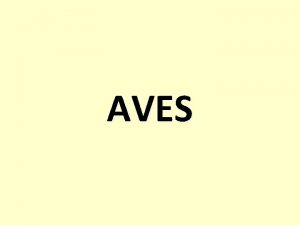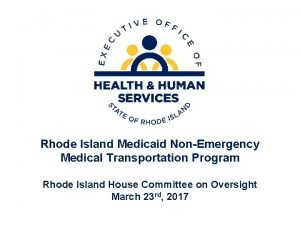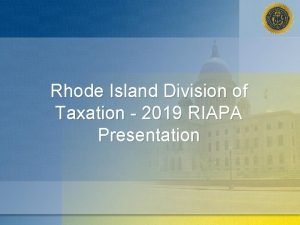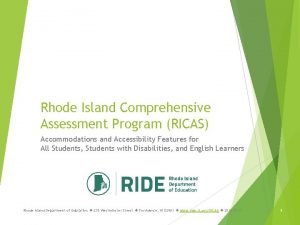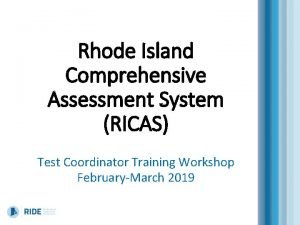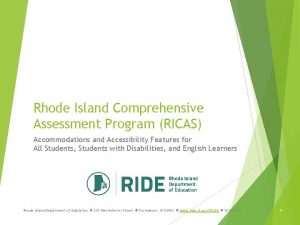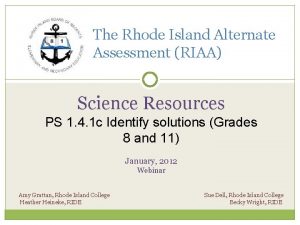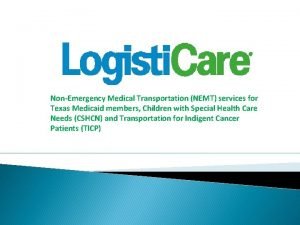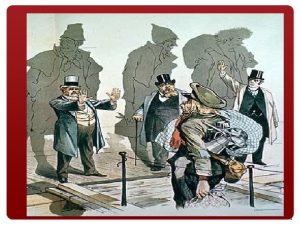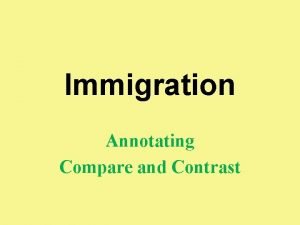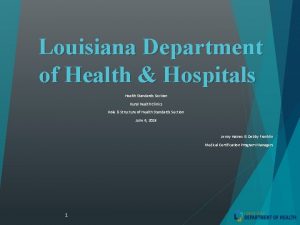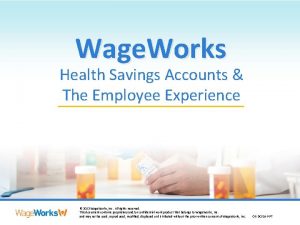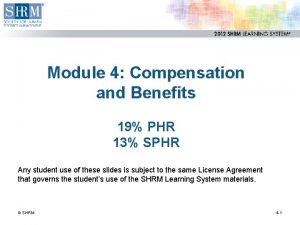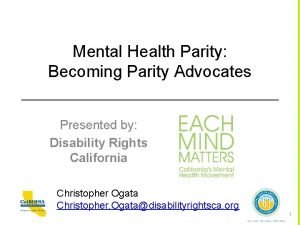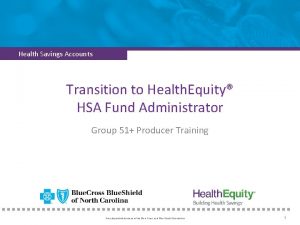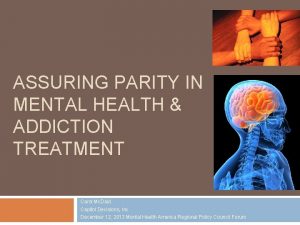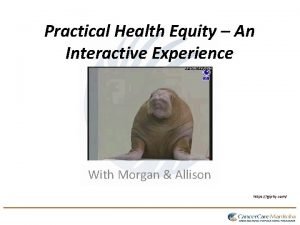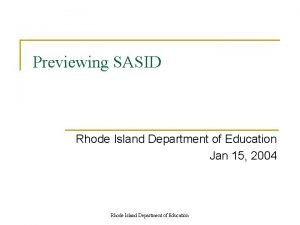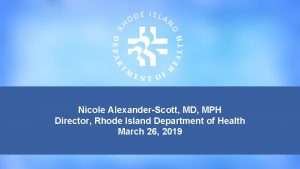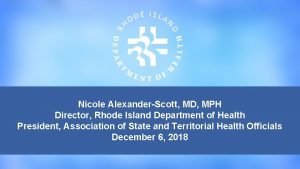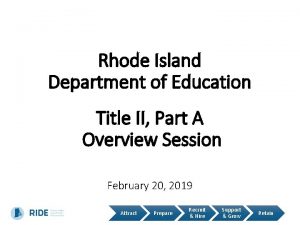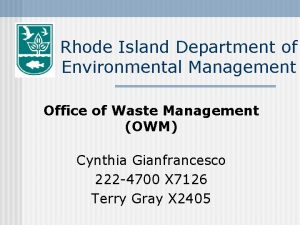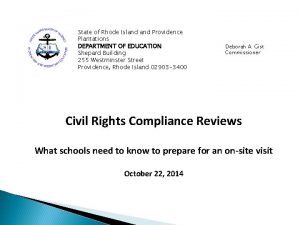Health Equity Institute Rhode Island Department of Health



























- Slides: 27


Health Equity Institute Rhode Island Department of Health. ri. gov

What Does Health Equity Mean? Health A state of complete physical, mental, and social well-being, and not merely the absence of disease or infirmity (World Health Organization)

What Does Health Equity Mean? Health Equity Achieving the highest level of health for all people. Health equity calls for focused efforts to address avoidable inequalities by creating fair opportunities for optimal health, especially for groups who have experienced social, economic, and political disadvantage or historical injustices. (Washington State Department of Health)

What Does Health Equity Mean? Health Disparities A difference in health status, health behavior, disability, morbidity, or mortality between socio-demographic groups RIDOH’s Health Equity Institute employs multiple methodologies to identify health disparities among socio-demographic groups

What Does Health Equity Mean? Health Inequalities A difference in health status, health behavior, disability, morbidity, or mortality between socio-demographic groups, where the group with the highest “burden” (or rate) has historically and systemically been marginalized or discriminated against. This difference is viewed as avoidable, unnecessary, and unjust.

What Does Health Equity Mean? Social Justice Social injustice is one of several root causes of inequities in the health and the wellbeing of individuals. Social justice challenges the roots of oppression and injustice, including marginalization based on race, class, gender, and other social classifications, and empowers all people to exercise self-determination and realize their full potential through collaborative action. ” *Definition of “Social Justice” from Place Matters (Alameda County Health Department)

What Does Health Equity Mean? Socioeconomic and Environmental Determinants of Health The conditions in which we live, learn, work, play, and age. These conditions can affect our health in significant ways. (World Health Organization)

RIDOH OVERARCHING GOAL Positively Demonstrate for Rhode Islanders the Purpose and Importance of Public Health RI Population Health Plan LEADING PRIORITIES Address Socioeconomic and Environmental Determinants of Health in Rhode Island Eliminate Disparities of Health in Rhode Island Promote Health Equity Ensure Access to Quality Health Services for Rhode Islanders, Including Our Vulnerable Populations CROSS-CUTTING STRATEGIES RIDOH Academic Center: Strengthen the integration of scholarly activities with public health RIDOH Health Equity Institute: Promote collective action to achieve the full potential of all RIers 9

Health Equity Institute Vision The Health Equity Institute envisions a Rhode Island where everyone has a fair opportunity to achieve their full potential, recognizing that every individual has inherent value as a member of a family, workplace, and community.

Health Equity Institute Mission The mission of the Health Equity Institute is to address systemic inequities so that all Rhode Islanders reach their full potential, regardless of: • • The color of their skin Where they were born Disability Gender identity Sexual orientation Neighborhood Religion • • • Occupation Language How much money they make Age Level of education

Who We Are The Health Equity Institute is composed of public health professionals working from the RIDOH Office of the Director to elevate the department-wide priority of equity through: 1. Implementing programs focused on disparity elimination; and 2. Incorporating an equity approach into systems and structures of RIDOH and other agencies.

HEALTH EQUITY INSTITUTE (HEI) Deborah Garneau, Director OPERATIONS LIAISON Erica Norcini HEI PHYSICIAN LEAD Ada Amobi EVALUATION/EPIDEMIOLOGY LIAISON COMMUNICATIONS LIAISON Sophie O’Connell Will Arias Equity Initiatives Equity Programs Special Needs / Disabilities Policy Team Racial and Ethnic Population Policy Team Colleen Polselli, Lead Michelle Wilson, Lead Adolescent Healthcare Transition Deb Golding, Coordinator GEMS/P 2 K Antonio Da Veiga, Manager Youth Internship Program Carmen Boucher, Coordinator Parent/Peer Engagement Carla Russo, RIPIN Manager Refugee Health Program Culturally and Linguistically Appropriate Service Standards (CLAS) Maternal and Child Health (MCH) Policy Team Health Equity Zones Policy and Implementation Jaime Comella, Lead Chris Ausura, Lead MCH Management Team Evaluation/ Sustainability Disparities in Infant Mortality Placed Based Community Development MCH Emerging Issues Program Implementation Determinants of Health Workgroups Housing, Chris Ausura Food Access, Ada Amobi Community Health Worker Association (CHWA) Sarah Lawrence, Lead Deborah Garneau, HEI Liaison Community Health Resilience Project (CHRP) Michelle Wilson, Lead Carmen Boucher, HEI Liaison Commission for Health Equity and Advocacy (CHAE) Mia Patriarca, Lead Deborah Garneau, HEI Liaison Sexual Orientation and Gender Identity (SOGI) C. Kelly Smith, Lead Colleen Polselli, HEI Liaison Equity Performance Measurement James Rajotte, Lead Chris Ausura, HEI Liaison Social Justice Roundtable Dana Mc. Cants, Lead Deb Golding, HEI Liaison Community Health Assessment Group (CHAG) Larry Warner, Lead Chris Ausura, HEI Liaison Kresge Initiative Julian Drix, Lead Carol Hall Walker, Provost Deborah Garneau, HEI Liaison Vulnerable Populations Workgroup Alvaro Tinajero, Carol Votta Will Arias, HEI Liaison

What We Do The Health Equity Institute gives voice to the vulnerable populations in the state to ensure that everyone has an opportunity to achieve health. Primary programmatic areas: • • • Disabilities/Special Needs Racial / Ethnic Populations Maternal & Child Health Equity Zones Socioeconomic and Environmental Determinants of Health

What We Do Core functions: • • • Policy Advancement Partnership Engagement & Collaboration Program Implementation and Technical Assistance Communications and Marketing Financial Management and Investing Systems Development

Health Equity Institute Supports Social Justice Roundtable • Create space for personal and professional conversations and reflection around a wide range of social justice issues Vulnerable Populations Workgroup • To standardize collection of socio-demographic information to improve inclusiveness and description of vulnerable groups in reporting Kresge Initiative • Efforts across the department to integrate social justice into the health equity agenda through staff training and external partnerships Sexual Orientation and Gender Identity Workgroup • To improve public health policies, systems, and environmental change

Health Equity Institute Supports Community Health Worker Association of RI • Bringing together community health workers to provide networking, support, training and other resources Determinants of Health Workgroups • Cross-program stakeholders addressing determinants of health such as housing, transportation, community development, education, food access, support Community Health Resilience Project • Cross-department work group that aims to integrate health equity, health promotion, and social justice to ensure the safety and health security of all members of the community

Health Equity Institute Supports Equity Performance Measurement • Highlighting the disparity measures and disparate populations among RI’s 23 Population Health Goals Commission for Health Advocacy and Equity • Legislatively established commission to advise the Governor, General Assembly and RIDOH about racial, ethnic, cultural, and socio-economic health disparities; to advocate for the integration of activities that will help achieve health equity; to help develop a health equity plan that addresses the social determinants of health; to align statewide planning activities in developing health equity goals and plans; and to educate other state agencies and organizations on health disparities Community Health Assessment Group • Cross-sector evaluation workgroup establishing a statewide surveillance system to monitor the State’s progress towards improving the social, economic, and environmental conditions that impact health

Measuring Determinants of Health Domain Determinant Healthcare Access Integrated Healthcare Social Services Behavioral Health Civic Engagement Community Resiliency Social Vulnerability Equity in Policy Natural Environment Physical Environment Transportation Environmental Hazards Housing Burden Socioeconomics Food Insecurity Education Discrimination Community Trauma Incarceration Public Safety

HEI 6 -Month Goals: Strategy Develop a HEI Strategic Plan • Develop a strategic plan to address capacity, staffing, and resources to accomplish program and policy scope. • HEI reinforces the equity lens from a social justice framework. Establish an active Commission for Health Advocacy & Equity • CHAE conducts bimonthly meetings with high attendance, purposeful engagement of RIDOH equity initiatives, and a meaningful policy agenda. Establish HEI role in advancing RIDOH’s strategic priorities • HEI overview presentations at Executive Leadership Team, Policy and Leadership Team, Program Manager, and Frontline Staff meetings; Equity lens review of grant applications; Participation in Division staff meetings at least quarterly; Convene, engage, and support RIDOH equity initiatives at least quarterly. Advance equity in community and across state government • Participate and lead as appropriate equity initiatives of Medicaid, the State Innovation Model Test Grant, the Children’s Cabinet, Rhode Island Housing, BHDDH, DCYF, RIDE, Accountable Entities, Real Jobs RI, and the Community Health Worker Association of RI.

HEI 6 -Month Goals: Data & Evaluation Identify and address disparities in RIDOH programs • Analyze dashboard metrics and 23 population health goals to identify measures of disparity. Establish an equity index • Convene the Community Health Assessment Group to establish 15 Equity Measures across 5 domains. Establish standards of demographic data collection • Support Vulnerable Populations workgroup of the Epidemiology/Evaluation group to create standards for assessing race, ethnicity, language, gender identity, sexual orientation, and disability status.

HEI 6 -Month Goals: Staff Competency Assess RIDOH staff knowledge of equity • Administer BARHII assessment to assess staff level of knowledge of health equity principles and determinants of health. Increase health equity learning opportunities • Support Social Justice Roundtable presentation and discussion series, Kresgesponsored Health Impact Assessment training, Kresge sponsored health equity communications training, Health Equity Summit, ASTHO Presidential Challenge initiatives, and health equity core competency series for new RIDOH employees and partners. Increase equity competency of HEI and HEZ staff • Support Health Equity Zone (HEZ) Project Officers in community development strategies, addressing socioeconomic and environmental determinants of health, and performance-based contract management; apply equity lens to all HEI programs; support cross training of HEI staff within Maternal and Child Health, Disabilities, and Minority Health programs.

HEI 12 -Month Goals: Strategy Secure resources to advance cross-cutting equity projects • Apply for health equity federal grants (REACH); seek foundation funding for HEZ support (community and RIDOH infrastructure); advance Health in All Policies agenda with RI legislature, CHAE, local funders, and other state agencies. Engage stakeholders in addressing health equity • Reinforce / establish RIDOH stakeholder engagement with vulnerable populations; support resident engagement at all levels of decision making in program implementation, policy development, advisory committees, boards and commissions; establish inter-agency equity framework. Establish Health & Determinant Workgroups • Convene work / stakeholder groups to address the interaction between particular social, economic and environmental determinants and health (Health & Housing; Health & Transportation; Health & Community Development; Health & Food Access; Health & Built Environment).

HEI 12 -Month Goals: Data & Evaluation Support disparities elimination in RIDOH programs • Provide technical assistance, applied research, and best practice support to RIDOH programs addressing disparities. Apply equity index to funding opportunities • Funding and programming decisions will be based on greatest need as indicated by health disparities and equity index. Produce annual equity reports • Work with the Commission for Health Advocacy and Equity (CHAE) and Community Health Assessment Group (CHAG) to produce annual reports that highlight disparities, vulnerable populations, at-risk communities, and health outcomes.

HEI 12 -Month Goals: Staff Competency Assess RIDOH staff knowledge of equity • Continually assess and address RIDOH staff equity knowledge and competency. Increase learning opportunities for RIDOH staff • Support Social Justice Roundtable presentation and discussion series, Kresge-sponsored Health Impact Assessment training, Kresge-sponsored health equity communications training, Health Equity Summit, and health equity core competency series for new RIDOH employees. Increase CLAS competency of RIDOH and partners • Offer comprehensive CLAS training internally and externally; assess CLAS compliance of contractors and partners; integrate CLAS into regulations, customer service, and communications; provide technical assistance to RIDOH programs.

Health Equity in Action

Deb Garneau Director Health Equity Institute Rhode Island Department of Health Deborah. Garneau@health. ri. gov
 Rhode island business development
Rhode island business development Ride ngsa portal
Ride ngsa portal Rhode island board of governors for higher education
Rhode island board of governors for higher education Interesting facts rhode island
Interesting facts rhode island Pradeep chopra md
Pradeep chopra md Galinha rhode island red
Galinha rhode island red Does logisticare pay weekly or biweekly
Does logisticare pay weekly or biweekly Rigl §44-30-12(c)(8)
Rigl §44-30-12(c)(8) Rhode island environmental police
Rhode island environmental police Ricas accommodations
Ricas accommodations Stem cell treatment rhode island
Stem cell treatment rhode island Ricas.pearson support.com/student
Ricas.pearson support.com/student Ricas reference sheet
Ricas reference sheet Rhode island comprehensive assessments system
Rhode island comprehensive assessments system Rhode island stormwater manual
Rhode island stormwater manual Medicaid transportation texas logisticare
Medicaid transportation texas logisticare What are islands
What are islands Ellis island vs angel island
Ellis island vs angel island Ellis island and angel island venn diagram
Ellis island and angel island venn diagram Island of the blue dolphins map
Island of the blue dolphins map Summit rhode islands toursism
Summit rhode islands toursism Louisiana health standards
Louisiana health standards Wageworks health equity
Wageworks health equity Benefits of phr
Benefits of phr Mental health equity
Mental health equity Health equity customer service
Health equity customer service Mental health equity
Mental health equity Health equity
Health equity

